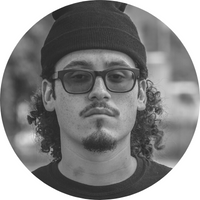
 Roni Essex
Freediver, Spearo, Creator
Roni Essex
Freediver, Spearo, Creator

 Roni Essex
Freediver, Spearo, Creator
Roni Essex
Freediver, Spearo, Creator
Most freedivers remember their first dive, not through numbers or depth, but through a feeling. It’s the quiet rush of submerging beneath the surface, the way the world shifts into slow motion, the way sound softens until all that remains is the rhythm of your heartbeat. That first moment is where everything begins. It’s where curiosity becomes breath. Where breath becomes silence. Where silence becomes home.
For some, it happens in a pool. For others, in the sea. Sometimes it begins with a game, sometimes with a dare, sometimes with a simple decision to stay underwater a little longer than usual. But in every case, there is a spark. A first breath.
“I don’t really remember when I started holding my breath. What I do remember is the feeling. I just knew I wanted to stay down there, to see how far I could get, before I had to come up. Freediving still feels like that to me. It’s not about numbers, it’s about going back to that place I first discovered as a child, that part of me that belongs in the water. That’s why I dive. Not to prove anything, not to break records, but because underwater I’m still that same kid.”
This is what makes freediving different from almost any other sport. It isn’t driven by equipment, or competition, or even achievement. At its core, it’s powered by something that begins long before technique is learned or goals are set. It’s powered by memory.
Think back to the first time you held your breath underwater. You might not remember every detail, but the sensation lingers somewhere in you. The water wrapped around your body differently. Your sense of gravity shifted. There was a moment when time stretched, when you wondered how long you could stay before you needed to come up.
That simple moment plants something deep inside us. It’s not just about discovering a physical ability. It’s about finding a new way of existing. Children don’t analyze. They don’t measure their lung capacity or worry about their equalization. They follow instinct. They play. And in that play, they touch something timeless.
As adults, when we dive deep with carbon fins, sophisticated wetsuits, and years of training, we’re often chasing that same feeling again. Not consciously, maybe. But it’s there. Every descent is, in some way, a return.
In competitive freediving, numbers are everywhere. Depth, time, discipline, ranking. Training logs fill with data. Sessions are tracked, improvements charted, results analyzed. This structure can sharpen performance, but it can also blur the original reason we fell in love with the water.
The feeling that began it all is quieter. It doesn’t scream for recognition. It lives in the moments between the surface and the deep. It lives in the seconds when you let go of thought and allow the dive to unfold.
Experienced divers often say that their best dives are not necessarily their deepest. They are the ones where everything feels simple and whole. Where body and water move together, without strain or resistance. Where the noise of achievement falls away, and only that childhood wonder remains.
In many ways, freediving is less about moving forward than it is about returning. Each dive is a journey back to a part of ourselves that existed before goals, before structure, before expectations. It’s the part that trusted water without hesitation. The part that felt at home beneath the surface.
This is why so many freedivers speak of diving as a way of remembering. The longer you’re in the sport, the more this truth becomes clear. Depth can be measured. Records can be broken. But that original spark cannot be recreated by numbers. It has to be felt.
And perhaps this is why freediving never truly loses its magic. Because no matter how skilled you become, no matter how precise your technique or how impressive your performances, every dive still begins with a breath. A single breath. The same as it did when you were a child.
First Breath is not a story about a place or a record. It’s about the emotional thread that runs through every freediver’s journey. The love of being underwater.
It’s the reason why seasoned athletes often surface from a perfect dive with a smile that looks exactly like the one they had as children playing in the shallows. It’s why so many freedivers describe the ocean as “home.”
When you take away the numbers, the medals, and the applause, what remains is pure. It’s the feeling that pulled you under for the first time. The one that stayed with you quietly, waiting for you to find it again.
For those just beginning their freediving journey, remembering this feeling can guide you through moments of doubt, frustration, or pressure. For those who have been diving for years, returning to it can rekindle the joy that started everything.
Training is essential. So is discipline. But neither should replace the simple wonder of the dive. When we dive, we are not becoming something new. We are remembering something old.
That’s the beauty of the first breath. It never leaves you.